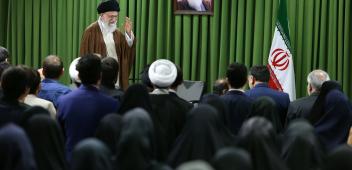International rules make U.S.-China conflict more likely
Cross-border principles governing conduct only exist if they are accepted by states. Originally published in Nikkei Asia Review

Unlike previous great power contests, competition between the U.S. and China is being waged through, and over the content of, international rules.
The winners of the First World War sought to reorder the world in the form of the League of Nations. They did so again after the Second World War, although more inclusively, by establishing the United Nations. Something similar happened after the Cold War, as the "Washington Consensus" expanded across the globe.
Neither China nor the U.S. is looking to reorder the world by winning a decisive war. Because both recognize that such a conflict could be catastrophic, they are trying to win without fighting and are using international rules and rule-writing as tools to constrain their adversaries and shape the world in their favor.
Long before the U.S. was willing to acknowledge its strategic competition with China, then U.S. President Barack Obama urged the adoption of the Trans Pacific Partnership trade agreement because it would allow "America -- and not countries like China -- to write the rules of the road in the 21st century." President Joe Biden's interim national security guidance published in March ended with a similar declaration that the U.S., not China, would shape "new global norms and agreements."
Under Xi Jinping, China has become more open about its intention to make, rather than merely take, rules. Unlike some foreign policy realists, the Chinese Communist Party understands that hard military or even economic power is not the only source of international influence.
The competition over new technology is central to this new domain of competitive rule writing. The battle to set global standards and dominate the market for 5G broadband cellular networks is playing out over other emerging technologies such as the rules about the development of facial recognition technology that involve fundamental questions of value.
But competition over rules could, paradoxically, make a military conflict more likely. The fundamental rules of international relations -- many of which are embodied in international law -- exist to manage competition and enable cooperation. These rules only exist insofar as they are accepted by states. Trying to determine them competitively is pointless. Great powers can simply decide to opt out.
Washington now more clearly recognizes the need for rules that will forestall conflict, with President Biden recently emphasizing the need for "responsible competition" bounded by "guardrails" in order to "ensure competition does not veer into conflict."
The recent surge in Chinese jets entering Taiwan's Air Defence Identification Zone has underscored the need for a working hotline. When U.S. Chairman of the Joint Chiefs of Staff Mark Milley recently revealed that in Donald Trump's final months he found it necessary to reassure his Chinese counterpart that they are were not about to be attacked, he added that such phone calls could take days or weeks to set up.
Washington's need for more cooperation with Beijing goes beyond crisis management. More broadly, it is necessary to address climate change -- still at the top of Biden's agenda -- and start talks on arms control, a need driven home by China's reportedly successful test of a Fractional Orbital Bombardment System.
China appears far less enthusiastic about "guardrails," with Beijing probably suspecting that such a concept is, in fact, another form of competitive rule-setting and a thinly-veiled attempt to lock in the status quo. China itself is no stranger to using conflict management for geopolitical ends. It is pushing an ostensibly neutral "Code of Conduct" for the South China Sea that would cement its dominance of that body of water.
Competition without guardrails is a game of chicken that Beijing seems readier to play. It may view Washington's recent pivot to "responsible competition" as a sign of weakness. Experience has shown that, Trump aside, most U.S. presidents come into office talking tough on China but, over time, come to realize the importance of engaging and accommodating it.
The challenge for Washington is to sell the concept of responsible competition as mutually beneficial without feeding the perception that this offer is a sign of weakness to be exploited. The sequencing of recent exchanges suggests that this is a delicate balance.
In Biden's Sept. 9 call with Xi, he presumably sealed the conciliatory "hostage exchange" deal involving the release from house arrest in Vancouver of Huawei Technologies executive Meng Wanzhou in return for the release of Canadians Michael Kovrig and Michael Spavor. It is also likely that Biden provided general forewarning of the trilateral security partnership involving the U.S., the U.K. and Australia.
AUKUS was announced on Sept. 15 while the release of Huawei executive Meng Wanzhou was announced on Sept. 24. The latter addressed one of the items on China's "List of U.S. Wrongdoings that Must Stop" and so enabled the Xi-Biden virtual meeting to take place by the end of the year. But Beijing has since shown that it remains willing to risk conflict over Taiwan in order to shift the status quo.
All is not lost if guardrails cannot be established. Washington's public outreach to Beijing supports the message it is sending the rest of the world. This is, as Defence Secretary Lloyd Austin and Vice President Kamala Harris have emphasized, that the U.S. is determined to compete with China but it does not "seek conflict."



